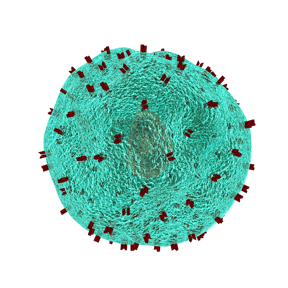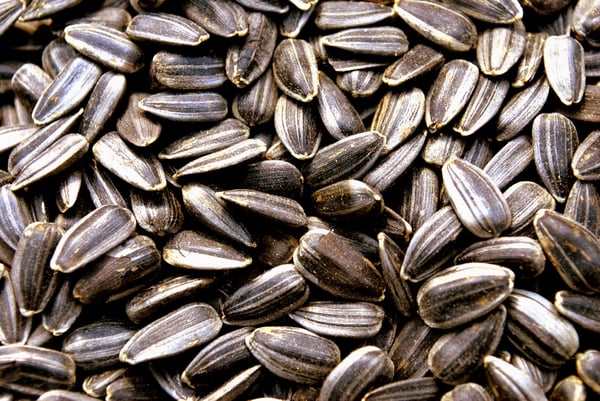One of the things that makes COPD so dangerous is the fact that it makes your body more vulnerable to disease. It not only makes you more likely to get sick, but it makes it harder to recover from illnesses, too.
For people with COPD, any sickness—even a common cold—can be serious or, in some cases, even life-threatening. Even worse are respiratory infections like pneumonia, which can cause permanent damage to lungs affected by COPD.
Because of this, it is imperative for every person with COPD to take good care of their immune system. Because your immune system is so closely linked with all of your body's other systems, that means making healthy choices when it comes to your diet, sleeping habits, personal hygiene, and even your mental health.
In this guide, we're going to tell you everything you need to know about how to keep your immune system in the best shape possible while managing your COPD. Using the practical tips in this article, you can make sure you are giving your body everything it needs to protect itself from illnesses and infections.
Because you never know when sickness will strike, it's important to make your immune system's health a priority now, and not put it off for the future. By building healthy immune habits early and continuing to be diligent, you may be able to prevent a number of illnesses that could worsen your COPD.
In this Guide:
- What Works and What Doesn't
- How Your Immune System Works
- How COPD Affects Your Immune System
- Practical Tips You Can Use to Boost Your Immune System the Right Way
- Vitamins and Nutrients You Need for a Healthy Immune System
- The Anti-Inflammation Diet
- Things that Don't Help Your Immune System
What Works and What Doesn't
The world around us is full of products that make lofty claims about boosting your immune system and staving off disease. You've probably seen them advertised on TV, in magazines, health food stores, and even your local supermarket.
Unfortunately, these products are usually nothing more than glorified snacks that won't boost your immune system in any way. So far, scientists haven't been able to confirm that any health food or supplement on its own will reliably improve your resistance to illness.
However, researchers have identified a variety of healthy habits and nutrients that support your immune system and keep it running smoothly. On their own, they are unlikely to make much of a difference, but putting them all together will help you build a healthier lifestyle that boosts your body's ability to fight off infection and disease.
It's important to know that keeping your immune system healthy isn't about taking a certain supplement or miracle vitamin; it's about giving your immune system everything it needs to stay strong. It's also about avoiding activities and habits that weaken your immune system's ability to respond to threats.
In these next sections, we're going to tell you all about all the nutrients, healthy habits, and other treatments like vaccines that you need to keep your immune system primed and ready to fight disease. While none of these things are miracle cures, they are the most effective, proven ways to keep your immune system strong and working as effectively and efficiently as possible.
How Your Immune System Works

The immune system is a very complex system that protects your body in a variety of different ways. It not only fights off pathogens, like viruses and bacteria, that make you sick, but it also helps your body destroy harmful toxins and misbehaving cells like cancer cells.
Your immune system is made up of many different tissues, cells, and molecules that are spread all throughout your body. But in general, your immune system can be categorized into two main parts: the innate immune response and the adaptive immune response.
The Innate Immune Response

The first step of your body's immune response is often referred to as the “innate” immune response. This is a broad, generalized immune reaction that gets triggered whenever you are sick, injured, or your body detects pathogens or irritation.
The innate immune response is quick, and its goal is to destroy any bacteria, viruses, parasites, or other harmful pathogens that enter your body. It does so by mobilizing pathogen-destroying cells (called leukocytes) and triggering inflammation.
Inflammation causes changes in your body that allow your immune system to heal the injury more quickly. It also triggers reactions like fever, runny nose, coughing, and sneezing that help your body flush pathogens out of your body more quickly.
In some cases, your innate immune response can become over-sensitive and react to things that are not harmful, causing it to trigger the inflammatory response when it is not needed. This can lead to chronic inflammation, which is linked to a variety of chronic diseases, including heart disease and COPD.
One of the most important parts of the innate immune system is a category of cells called leukocytes, also known as white blood cells. Leukocytes are one of the most important parts of the immune system and they come in a variety of different types.

The primary responsibility of leukocytes is to track down and destroy all kinds of viruses, bacteria, and other pathogens, and each type of leukocyte has its own pathogen-hunting specialty. For example, phagocytes, which make up one category of leukocytes, kill pathogens by surrounding them and dissolving them with a cocktail of toxic chemicals.
Leukocytes lie in wait in many different places throughout your body, ready to spring into action as soon as they detect a pathogen to destroy. They can also travel around in your bloodstream, which allows them to quickly get to any place in the body where they are needed.
The Adaptive Immune Response

One of the most incredible talents of the immune system is its ability to learn and adapt to its environment. This is the job of the second main part of your immune system, the “adaptive” immune response.
Unlike the innate immune system, which fights pathogens in general, the adaptive immune system is responsible for tracking down and killing specific pathogens. It does this by creating antibodies whenever it encounters a new type of pathogen that it hasn't seen before.
Antibodies are molecules that can only stick to one specific type of pathogen, such as a specific type of virus or a particular bacteria species. When an antibody encounters the matching pathogen, it binds, or sticks, itself to the pathogen's surface.
This tag alerts leukocytes to the pathogen's presence and marks it for destruction. As a result, your immune system will recognize the pathogen much more quickly than it would if there were no antibodies around to help.
In this way, antibodies act as a sort of “memory” that allows your immune system to quickly identify viruses and bacteria that it has encountered before. This helps your immune system respond more rapidly and effectively to threats, reducing your chance of getting sick.
How COPD Affects Your Immune System
COPD has long been known to weaken the immune system and make patients more prone to disease. While researchers still do not fully understand why this happens, the link between COPD and poor immune system function is clear.
One reason for this is chronic inflammation, which afflicts the vast majority of patients with COPD. Studies show that chronic inflammation has a detrimental effect on the immune system, reducing its ability to fight disease.

Usually, inflammation triggers your immune system to act and neutralize whatever caused the inflammation. But in the case of chronic inflammation, your immune system overreacts when there is no real physical threat to neutralize.
As a result, the inflammation continues indefinitely and your immune system stays perpetually preoccupied with the imaginary threat. This unchecked inflammation puts a great deal of stress on your body (including your lungs) and makes your immune system less effective at countering real threats.
As the Cleveland Clinic puts it, “sustained, high levels of inflammation point to an overworked, over-tired immune system that can't properly protect you.” Unfortunately, chronic inflammation is a reality for the majority of people with COPD.
This has led some researchers to believe that COPD may be, at least in part, an autoimmune disease. An autoimmune disease is a disease that causes your body's immune system to mistakenly attack your body's own healthy cells.
The immune systems of people with COPD tend to overreact to minor irritants that you breathe in, causing inflammation in the lungs. Instead of attacking just the irritant, the immune system may end up attacking healthy lung tissue, resulting in permanent damage to the lungs that researchers believe may both cause and worsen COPD.
Chronic inflammation in the lungs can also make the lung tissue more susceptible to bacteria that cause respiratory illnesses and infections. Another problem is constant airway blockage from excess mucus and airway constriction, which makes it easier for infections to take hold in your lungs and airways.
It is also very common for COPD patients to suffer from anxiety, stress, and depression, which are known to weaken your immune system. COPD also impairs many patients ability to sleep, and lack of sleep is also linked to poor immune system function.
Other immune system problems faced by patients are indirectly caused by the symptoms of COPD itself. For instance, patients who get short of breath easily often struggle to keep up with healthy habits that are necessary for a healthy immune system, including exercising and eating a healthy diet.
However, probably the most important reason that COPD patients have to take extra good care of their immune systems is to avoid COPD exacerbations. Exacerbations can be triggered by even mild illnesses and infections, and a healthy immune system is your first line of defense against getting sick.
Exacerbations make your COPD symptoms much worse and they can last for weeks or longer, which makes it very difficult to stay active and live a healthy lifestyle. Serious exacerbations can be even more devastating, causing permanent lung damage, sending you to the hospital, or even leading to respiratory failure and death.
Practical Tips You Can Use to Boost Your Immune System the Right Way

Because the immune system is so complex and varied, there is no one, definitive way to “boost” it. However, that doesn't mean that that your lifestyle and behaviors don't affect how your immune system works.
Lots of factors, including your nutrition, exercise habits, mental health, and more can have a significant effect on how efficiently your immune system functions. Luckily, that means that there are many things you can do in your daily life to keep your immune system healthy.
Stop Smoking

Smoking tobacco is bad for your immune system and makes your more prone to getting sick. Because most people who have COPD are smokers or former smokers, this is a common problem among COPD patients.
Smoking negatively affects the leukocytes in your body and suppresses your immune response. It also causes inflammation in your lungs that can make your COPD symptoms much worse.
Smoking also causes damage to other cells all throughout your body, which triggers a chronic state of inflammation. This inflammation increases your risk for infections, heart disease, and other serious health conditions.
However, if you quit smoking, your immune system can and will recover. If you have COPD and you still smoke, then it is absolutely imperative that you quit.
Quitting smoking is one of the best things you can do to improve your health and your overall quality of life with COPD. If you need help, visit the CDC's website to learn about a variety of quit smoking resources that can help you succeed.
It's never too late to stop smoking. Doing so will not only help your immune system, but it can also improve your COPD symptoms and prevent other serious diseases.
Don't Drink Too Much

While there's nothing wrong with a drink now and then, too much alcohol can hurt your immune system. It does this by suppressing the activity of leukocytes and reducing your immune system's ability to recognize and respond to threats.
Any kind of excessive drinking, including binge drinking and chronic alcohol use, can weaken your immune system. In fact, studies show that alcohol effects your immune system within twenty minutes of taking a drink, and that just one instance of binge drinking can significantly increase your risk for infection for days after you've sobered up.
This leaves your body more vulnerable to illnesses, infection, and other diseases like cancer. In combination with the already present immune-suppressing effects of COPD, excessive drinking can be particularly dangerous for COPD patients.
That's why, if you have COPD, you should be especially careful to avoid alcohol or at least drink in moderation. US guidelines for alcohol use recommend that you drink no more than seven standard drinks per week.
If you struggle with alcohol abuse or need help quitting or reducing your drinking, visit the Alcohol Rehab Guide to learn about a variety of resources that can help.
Stay Active

If you have COPD, then you know that staying active is important for keeping your heart and lungs healthy. However, physical activity is just as important for your immune system, as well.
Researchers aren't sure exactly why, but getting regular exercise improves your immune system's ability to fight off disease. One study showed that just twenty minutes of physical activity every day can reduce inflammation and help your immune system function more effectively.
Even though COPD can make exercise difficult, it's important to find some physical activities that you find engaging and fun. Even if you have to start small, you can improve your physical strength and endurance with time.
If you need help working out a feasible exercise plan, don't be afraid to ask your doctor for advice. If your COPD symptoms are preventing you from exercising, your doctor may be able to recommend another treatment, like pulmonary rehabilitation or supplemental oxygen, that can help you stay active.
Getting regular exercise can be as simple taking daily walks, bicycling, or doing aerobic exercises at home. For more tips on how to stay active with COPD, visit our guide to exercising at home with COPD here.
Vaccination
Vaccination is the only targeted treatment scientists have found that can reliably and significantly boost the immune system on its own. That's why doctors often urge COPD patients to get vaccinated as a first line of defense against illnesses like the flu and pneumonia.
Vaccines work by exposing your body to a tiny amount of a disease-causing pathogen that has been weakened or killed. The vaccine doesn't contain enough of the pathogen to get you sick, but it contains just enough for your immune system to recognize it and respond.
Your immune system reacts to the vaccine by making specific antibodies that target the pathogen in the vaccine. Then, if you are ever exposed to the pathogen in the future, your immune system will be primed and ready to destroy it before it has a chance to get you sick.
Here are the vaccines typically recommended for people with COPD:
- The Influenza Vaccine: Get vaccinated every year to protect yourself before flu season.
- Td Vaccine: Get vaccinated once every ten years to protect yourself from tetanus.
- Pneumococcal Vaccine: Get vaccinated once before the age of 65, and then twice again after the age of 65 to protect yourself from bacterial pneumonia
If you are not sure if you are up to date on these or any other vaccines, talk to your doctor. He can review your records and tell you what vaccines could be beneficial for you.
Reduce Stress

Chronic stress and other mental disorders like depression are well-known triggers for inflammation and immune system distress. Because of this, keeping stress at a minimum and treating anxiety and depression are important for keeping your immune system in good shape.
For instance, a variety of studies have found that people who experience chronic stress are more likely to contract a common cold. Chronic stress can also reduce your body's ability to heal itself, fight cancer, and gain immunity from vaccines.
Depression has also been linked to chronic inflammation and reduced immune system function. While researchers are still trying to understand exactly why this happens, they do have some idea of how it works.
Stress increases the amount of a “stress chemical” known as cortisol, which triggers inflammation. It also reduces the number of leukocytes in your body, making it harder for your immune system to fight off disease.
Unfortunately, chronic stress, anxiety, and depression are very common among people with COPD. Fortunately, there are many different things you can do to reduce your stress, treat depression, and improve your mental and emotional health.
Check out these guides for managing stress, anxiety, and depression:
- How to Treat Depression When You Have COPD
- How to Treat Anxiety and Panic Attacks When You Have COPD
Get Good Sleep

Sleep is an incredibly undervalued activity in the modern world. Despite the fact that it's necessary for survival, many people don't sleep enough and don't understand the importance of high quality sleep.
Many studies have shown that you are more likely to get sick when you don't get proper sleep. Being sleep deprived can also hamper your ability to recover from illnesses and infections, causing you to stay sick for longer.
Poor sleep has particularly serious consequences for people with COPD and can significantly increase their chances of experiencing a COPD exacerbation. Some studies have also found that sleep deprivation significantly impairs COPD patients' ability to breathe.
That's why it's so important to make sleep an important priority in your life. Most adults need at least 7-8 hours every single night, and any less can significantly affect your quality of life.
Unfortunately, COPD patients in particular often struggle to sleep because of their disease. This is partially because many COPD symptoms, including breathlessness, airway blockage, and chest discomfort, get worse for many patients in bed at night.
Fortunately, there are many things you can do to improve your sleep quality and your ability to fall sleep at night. It's all about establishing a consistent, relaxing nighttime routine and making sure you have a comfortable sleeping environment.
Here are some tips for improving your sleep when you have COPD:
- Always go to sleep at the same time every day; this allows your body's natural circadian rhythm to stay stable, which helps you more easily fall asleep and stay asleep.
- Keep your bedroom free from work, clutter, and electronics.
- Do quiet and relaxing activities before bed, and avoid doing anything that causes you stress.
- Only use your bed for sleeping and sex, that way your body knows that when you go to bed, it's time to sleep
- Get exercise during the day to help yourself feel more relaxed and sleepy at night.
- Avoid alcohol and caffeine in the evening because they can impair your ability to sleep.
- Practice mucus clearance techniques before bedtime to reduce airway congestion and coughing at night.
- Get tested for sleep apnea to make sure this common disorder isn't the cause of your sleep problems.
- Talk to your doctor about using nighttime oxygen if you struggle to breathe in bed at night.
Always Practice Good Personal hygiene

No matter how strong your immune system is, one of the best ways to protect yourself from illness is to avoid exposing yourself to viruses and bacteria in the first place. The best way to do that is to stay away from people who are sick and practice good personal hygiene.
Personal hygiene includes a variety of different habits and behaviors that help you prevent germs from getting into your body. One of the most important things is washing your hands, which you should do often, especially in public places.
This is particularly important if you have COPD, because getting a minor virus or bacterial infection can cause dangerous COPD exacerbations. You should be particularly careful to stay away from people with respiratory illnesses like the common cold or flu.
Here are some more tips for practicing good personal hygiene:
- Bring hand sanitizer with you to public places to use when you cannot wash your hands.
- Always wash your hands before eating, after using the bathroom, being in a public place, or anytime your hands get soiled.
- Avoid touching your face (including your eyes, nose, and mouth) with your hands, especially when out in public.
- Avoid touching public pens and other surfaces in doctor's offices and hospitals.
Get the Vitamins and Nutrients You Need for a Healthy Immune System

Your immune system is made up of a wide variety of cells, organs, and tissues that work together to protect your body from disease. In order to do their job well, all of these cells and tissues need fuel to help them track, hunt down, and destroy their enemies.
This fuel comes in the form of vitamins and nutrients that your body absorbs from the foods you eat. That's why, if you want a healthy immune system, you need to eat a healthy diet.
A balanced diet full of plenty of fruits and veggies is the best way to keep your body healthy, and your immune system by extension. However, there are some specific vitamins and nutrients that are particularly important to pay attention to when it comes your your immune system's health.

Research shows that nutrients like selenium, vitamin C, vitamin D, and more are especially important for helping your immune system function. In order to keep your immune system in top disease-fighting shape, you need to make sure you get enough of all of these nutrients from your diet.
It's not enough to binge on them before you get sick, either; you need to meet your body's vitamin needs every day to get the best results. That's why it's so important to eat a healthy diet that supplies you with plenty of vitamins and prevents any nutritional deficiencies.
You may need to take certain vitamins and supplements to ensure that your body always has enough nutrients to keep your immune system running strong. However, the point is to make sure that your body has just enough of each particular nutrient to meet your body's needs, not necessarily to get an extra dose.
There are some exceptions, however, and some studies suggest that getting extra amounts vitamin C zinc, for example, may be able to improve immune system function. In most cases, however, getting extra nutrients won't make a difference if you already eat a healthy diet and your immune system already has everything it needs.
The vitamins and nutrients we discuss in this section are all uniquely important for your immune system and necessary for it to do its job well. If you struggle to eat a healthy diet, then you may need to make a dedicated effort to eat more of these immune system-supporting vitamins and nutrients.
Let's take a look at each of these nutrients and why they are important for your immune system. We'll even give you some examples of foods you can include in your diet to make sure you get enough of each nutrient every day.
Vitamin C

Vitamin C is a necessary nutrient for a variety of immune system functions. It is particularly vital for leukocytes, which use vitamin C's antioxidant properties as a tool to destroy pathogens.
Studies show that leukocyte cells contain large amounts of vitamin C that they use to dissolve bacteria and viruses. Vitamin C is also important for regulating how your immune system cells grow and develop.
There is some evidence that taking extra vitamin C supplements can prevent the common cold or reduce how long a cold lasts. While not all scientists agree that it is effective, some studies suggest that it may still be worth trying because of its safety and relatively low cost.
US dietary guidelines for older adults recommend that you get about 90 milligrams of Vitamin C per day. That's just a little more than one cup of kale or one medium orange.
Sources of Vitamin C in foods:
- Leafy green vegetables (e.g. kale, Brussels sprouts, spinach, broccoli)
- Citrus fruits (e.g. lemons, oranges, grapefruit)
- Peppers (e.g. bell peppers, chili peppers, yellow peppers)
- Potatoes
- Tomatoes
Vitamin A
One of the ways that vitamin A helps your immune system is by helping your body repair tissues that are damaged by infection. It also helps your lymphocytes and other immune system cells function more efficiently.
If you are deficient in vitamin A, it impairs the ability of your immune system to react to antibodies and kill invading pathogens. This makes you more prone to contagious illnesses and infections, and is a major problem in parts of the world where food is scarce.
According to US dietary guidelines, older adults should get about 900 micrograms of vitamin A every day. Fortunately, it's easy to get this amount if you eat lots of colorful vegetables and leafy greens; the daily recommended intake of vitamin A is equivalent to about ½ cup of boiled spinach or a little more than ½ cup of carrots.
Sources of Vitamin A in foods:
- Leafy green vegetables (e.g. kale, Brussels sprouts, spinach, broccoli)
- Sweet potatoes
- Beef liver
- Carrots
- Pumpkins
- Red Peppers
- Eggs
- Milk and dairy products
- Fortified cereals
Vitamin E

Vitamin E is vital for many important immune system functions, including regulating how certain immune cells grow and develop. It seems to be particularly important for keeping your immune system working effectively as you age.
In fact, some studies suggest that older adults who get plenty of vitamin E have stronger immune responses and are less likely to get sick. On the other hand, if you are deficient in vitamin E, it can wreak havoc on your immune system.
US dietary guidelines recommend that all older adults get about 15 milligrams of vitamin E every day. 15 milligrams is equivalent to about two ounces of sunflower seeds or ½ cup of almonds.
Sources of Vitamin E in Foods:
- Nuts (almonds, sunflowers, hazelnuts, peanuts, pine nuts, etc.)
- Wheat germ vegetable oil and sunflower oil
- Spinach
- Avocados
- Tomatoes
- Eggs
- Tuna, sardines, and herring
Vitamin B6

Vitamin B6 is necessary for the growth and development of immune system cells, especially leukocytes. It also helps your immune system produce antibodies and fight off illnesses and infections.
According to US dietary recommendations, older adults should get at least 1.7 milligrams of vitamin B6 every day. While that doesn't seem like much, it can be a difficult goal to reach; 1.7 milligrams is slightly more than what you will get from 6 ounces of tuna or four servings of chicken breast (3 ounces each).
Sources of Vitamin B6 in Foods:
- Beef liver
- Chickpeas
- Tuna
- Salmon
- Chicken breast
- Turkey
- Potatoes
- Ground beef
- Onions
- Fortified Cereals
Selenium

Selenium is an important nutrient that helps regulate your immune system and how your immune system cells grow and develop. It also plays an important role in both activating the immune response and shutting down excessive and unnecessary immune responses like chronic inflammation.
Older adults should get about 55 micrograms of selenium every day according to US dietary guidelines. That is the equivalent of a little more than 3 ounces of salmon or a little less than two servings of turkey, pork, or beef.
Sources of Selenium in Foods:
- Brazil nuts (eat only occasionally; they contain about 10 times the recommended daily amount and eating them too often can can be toxic)
- Many types of fish (e.g. tuna, sardines, shrimp, salmon, halibut, oysters, clams, and crab)
- Turkey
- Pork
- Beef
- Chicken
- Beans
- Eggs
- Sunflower seeds
- Fortified pastas and grains
Iron

Iron plays a complex role in the immune system that still isn't fully understood by researchers. However, it is a vital nutrient that aids your immune system cells in growing and functioning effectively.
According to US health guidelines, older adults should get about 8 milligrams of iron in their diet every day. That's is equivalent to a little more than two 3.5 ounce servings of cooked spinach or one cup of coked lentils.
Sources of Iron in Foods:
- Shellfish (e.g. clams, oysters, and mussels)
- Legumes (e.g. beans, lentils, peas, soybeans, and chickpeas)
- Spinach
- Beef liver
- Ground beef
- Turkey
- Quinoa
- Pumpkin seeds
Copper

Copper is another nutrient that is vital for the immune system but poorly understood by scientists. Researchers do know, however, that people who are deficient in copper have fewer numbers of a certain type of leukocyte known as a neutrophil, and that their neutrophils have a reduced ability to destroy pathogens.
US dietary guidelines for older adults suggest that you should get about 900 micrograms of copper from your diet every day. That's less than 1/2 cup of cashews or one cup of shiitake mushrooms.
Sources of Copper in Foods:
- Certain types of seafood (e.g. oysters, lobster, crab, and octopus)
- Mushrooms (e.g. shiitake mushrooms, white mushrooms, and morel mushrooms)
- Seeds (e.g. sesame seeds, sunflower seeds, pumpkin seeds, flax seeds)
- Nuts (e.g. cashews, hazelnuts, Brazil nuts, walnuts, pistachios, almonds, and pecans)
- Beans (e.g. soybeans, chickpeas, kidney beans, and white beans)
- Dried fruits (e.g. dried apricots, peaches, raisins, and figs)
- Kale
- Avocados
- Goat cheese
- Fermented soy (e.g. fermented tofu and miso)
Zinc

Most vitamins and nutrients, including most of the ones we've discussed, are only beneficial up to the point that they meet your body's basic nutritional requirements. That means that getting extra amounts beyond typical dietary guidelines doesn't do anything for your health.
Zinc, however, may be an exception to this rule in the sense that taking extra zinc supplements may be able to protect you from getting sick. However, the evidence that zinc supplements help your immune system is limited and still under investigation.
Several studies have shown that children who take zinc supplements when they get colds have less severe symptoms and recover from colds faster. However, researchers are not sure whether or not zinc is as effective for treating colds in adults as it is for children.
Zinc supplements seem to be most effective when you take them at the beginning of a cold, immediately after you start showing early symptoms. If effective, they can shorten how long the cold lasts and even reduce how severe your symptoms become.
Some studies also suggest that taking a 100mg zinc supplement daily may even be able to prevent the common cold, although the evidence for this is not as robust. Remember that you should always talk to your doctor first before starting any nutritional supplement or treatment, including zinc.
Taking Nutritional Supplements

Vitamins and nutritional supplements can be an effective way to ensure that your body gets all the nutrients you need. However, they are most helpful for people who have a specific vitamin deficiency or cannot get what they need from their diet.
Contrary to popular belief, taking extra amounts of a vitamin or supplement will not give your body a “boost” in the vast majority of cases. More is not always better, and your aim should be simply to meet healthy nutritional goals, not take high doses of any particular nutrient.
When possible, it's almost always better to get vitamins and nutrients from food rather than supplements. Because your body is designed to absorb nutrients from complex foods in the presence of a variety of other nutrients, dietary supplements are often more difficult for your body to absorb.
You also run the risk of getting too much of a vitamin or nutrient when you take supplements, which can actually be counterproductive. Getting too high a dose of vitamin A, for example, can actually hamper your immune system and cause other health problems like liver damage and bone pain.
Consider Following an Anti-Inflammation Diet

Studies show that the foods that you eat can affect your body's inflammatory response. Certain foods are more likely to cause inflammation (known as pro-inflammatory foods), while other foods are less inflammatory, or may even help fight inflammation (known as anti-inflammatory foods).
Now, researchers are trying to develop an “anti-inflammation diet,” which they believe may be able to reduce chronic inflammation. This diet excludes foods that are pro-inflammatory and it could be helpful for people who suffer from chronic inflammation and inflammatory diseases like COPD.
This is a promising area of research, but scientists are still not sure whether following an anti-inflammatory diet is an effective way to reduce chronic inflammation. However, it still may be worth trying, especially since most anti-inflammatory foods are healthy and full of vitamins and nutrients.
Chronic inflammation is a major problem for people with COPD, and it's one of the major reasons for patients' weakened immunity. Because of this, if you have COPD, you may want to give an anti-inflammation diet a try.
Foods to Eat for an Anti-Inflammation Diet
An anti-inflammation diet is, more or less, what any healthy diet should look like. It should be full of whole grains, colorful fruits and vegetables, leafy greens, lean proteins, and healthy fats.
That said, there are some foods that are recommended for being particularly anti-inflammatory. Many of these foods are high in antioxidants, omega-3 fatty acids, and other healthy nutrients.
Anti-Inflammatory Foods You Should Eat:
- Fatty fish (e.g. salmon, tuna, sardines)
- Nuts
- Tomatoes
- Leafy green vegetables
- Fruits
- Beans
- Herbs and spices
- Olive oil
Pro-Inflammatory Foods You Should Avoid:
- Red meats
- Dairy products
- Margarine, shortening, and lard
- Simple carbohydrates (e.g. sugars, white breads, pastas, and refined grains)
- Fried foods
- Processed foods
- Sugary foods
If you focus on including more pro-inflammatory foods in your diet and eliminating anti-inflammatory foods, you may be able to strengthen your immune system and reduce your risk for disease. However, even if it doesn't have any noticeable immune-boosting effects, the increase of fruits and veggies in your diet may still improve how you feel.
Remember that you should always consult your doctor about any major changes to your diet, supplements, exercise routine, or other significant lifestyle changes. Even though an anti-inflammation diet is considered healthy and safe, you should still talk to your doctor if you plan to make a significant dietary change.
Things that Don't Help Your Immune System

“Don't forget to wear a coat or you might catch a cold!” is one of those things that many people say without ever questioning where it comes from. It turns out, however, that this old saying is simply a myth.
Every culture has its own traditional beliefs and “old wives tales” about how to prevent illnesses, but many of them are not true. The idea that cold temperatures can cause you to get sick is one of them, and it probably started because cold and flu season happens during the colder winter months.
Fortunately, we now have a modern system of science and medicine that is more sophisticated than any that we've had in human history. It allows us to figure out which ideas are actually supported by medicine and which ones are just assumptions.
As a general rule, “health” foods and drinks that claim to boost your immune system are just like these unfounded old wives tales and they aren't going to have any noticeable effects. They are often based on exaggerated, outdated, or misrepresented ideas about how certain vitamins and other substances work.
That's why you should always be suspicious when a product makes lofty health claims or someone suggests a new “natural” treatment that you've never heard of. If it seems exaggerated or far-fetched, chances are that it is.
For instance, you might have heard that consuming anything from kombucha tea, garlic, and wheatgrass to green tea and even lemon water can improve your immune system health. Unfortunately, none of these things are supported by science and there is no evidence at all that they work.

These kinds of “fake” immune-boosting products and treatments are at best a waste of money and at worst misleading to people who are looking for effective treatments. That's why it's best to steer clear of quick fixes and focus on making healthy choices every day.
A well-rounded approach to your nutrition, and making sure you don't become deficient in any of the nutrients that support a healthy immune system, can help your immune system function more effectively. So can all the other things we discussed in this article, including good sleep, regular exercise, and avoiding alcohol and tobacco.
Unfortunately, the only way to help your immune system is to take a multi-faceted and balanced approach to improve your health. Unlike what many companies and “natural” health blogs claim, it is never as simple as taking a certain pill or drinking a certain kind of health smoothie.
Here is a list of some commonly advertised yet ineffective treatments that falsely claim to help your immune system.
Unsupported Immune System Treatments to Avoid
- Echinacea
- Green tea
- Garlic
- Wheatgrass
- Lemon water
- Kombucha tea
- Homeopathic and herbal remedies
Conclusion
If you suffer from COPD, looking after the health of your immune system is an important responsibility. The disease both weakens your immune system and can make any illnesses you get significantly more severe.
While you cannot always control when you get sick, your habits and lifestyle can still have a major effect on how often and how severely you get ill. To keep your immune system healthy, you have to maintain a healthy balance in your lifestyle and nutrition.
Using the tips in this article, you can make sure that you are providing your immune system with everything it needs to protect your body as well as it can. If you do this and avoid behaviors that hurt your immune system's ability to function, you will be much better protected from illnesses and infections that worsen your COPD.


.png)



